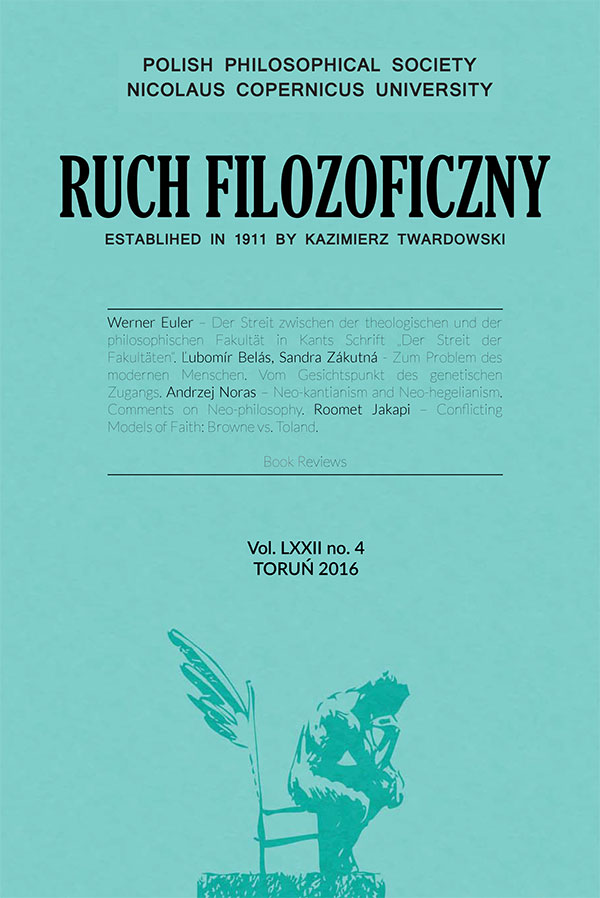The Querist and the Development of George Berkeley’s Understanding of Society
DOI:
https://doi.org/10.12775/RF.2016.042Keywords
George Berkeley, the Querist, British empiricism, 18th-century Ireland, social philosophyAbstract
The late editions of the Querist (1737–1750) appeared almost 40 years after George Berkeley published his Passive Obedience (1712) and almost 30 after An Essay Preventing the Ruin of Great Britain (1721), the first of his writings dealing with the problems of Ireland’s economy. During the period similar issues were raised in at least two of Berkeley’s writings, namely A Proposal for the better Supplying of Churches in our Foreign Plantations (1724), and the Alciphron (1732). The differences between the earlier writings and the Querist, as well as between the earlier and the later editions of the latter work, allow posing a thesis concerning the development of Berkeley’s understanding of the society and its relation to morality and religion. The change refers to an organistic conception of the society, a deeper understanding of non-rational factors shaping human behaviour, and a greater tolerance for Catholics. This new position is seconded by a new approach to nature which no longer is a perfect whole.
References
Airaksinen, T. “Light and Causality in Siris”. In T. Airaksinen, B. Belfrage (eds.) Berkeley’s Lasting Legacy: 300 Years Later. Newcastle upon Tyne: Cambridge Scholars Publishing, 2011, pp. 91–120.
Airaksinen, T. “The Chain and The Animal: Idealism in Berkeley’s Siris”. In S. Gersh, D. Moran (eds.) Eriugena, Berkeley, and the Idealist Tradition. Notre Dame IN: University Press of Notre Dame, 2006, pp. 226–227.
Airaksinen, T. “The Path of Fire: The Meaning and Interpretation of Berkeley’s Siris”. In S. H. Daniel (ed.) New Interpretations of Berkeley’s Thought. Amherst, New York: Humanity Books, 2007, pp. 269–271.
Belfrage, B. “A paradigm shift in George Berkeley’s philosophy 1707–1709”. Revue philosophique de la France et de l’étranger, vol. 135, no. 1 (2010), pp. 71–82.
Belfrage, B. “The clash in semantics on semantics in Berkeley’s Noteboook A”. In D. Berman (ed.) George Berkeley. Essays and Replies, Dublin: Irish Academic Press and Hermathena, 1986, pp. 117–126.
Downing, L. “Siris and the Scope of Berkeley’s Instrumentalism”. The British Journal for the History of Philosophy 3 (1995), pp. 279–300.
Flage, D. Berkeley. Cambridge – Malden: Polity, 2014.
Grzeliński, A. “From the ‘Querist’ to ‘Siris’ and Back. Berkeley’s Social Philosophy 1737–1752”. Ruch Filozoficzny, vol. 71, no. 4 (2015), pp. 155–169.
Hanczewski P. “Learning from Scotland’s problems: George Berkeley and his ‘Plan’ for Ireland”. Ruch Filozoficzny, vol. 71, no. 4 (2015), pp. 129–143.
Johnson, G. A. The Development of Berkeley’s Philosophy, London: Macmillan,
Kelly, P. “Berkeley’s economic writings”. In K. Winkler (ed.) Cambridge Companion to Berkeley, Cambridge–New York: Cambridge University Press, 2005, pp. 339–368.
Kelly, P. “Berkeley‘s ‘Querist’: ‚Hints... what is to be done in this Critical State of our Affairs‘ or proposals for a Hyperborean Eutopia?”. In R. Brook, B. Belfrage (eds.) Bloomsbury Companion to Berkeley. London – Oxford – New York – New Delhi – Sydney: Bloomsbury Publishing, 2017.
Kelly, P. “Ireland and the Critique of Mercantilism in Berkeley’s Querist”. In George Berkeley. Essays and Replies, pp. 101–116.
Luce A. A., Jessop T. E. (eds.) The Works of George Berkeley. London: Thomas Nelson, 1948–1957.
Olscamp, P. J. The Moral Philosophy of George Berkeley. The Hague: Martinus Nijhoff, 1970.
Szymańska-Lewoszewska, M. “Religion and Politics George Berkeley’s Understanding of Ireland’s Wellbeing in Early and Late Editions of ‘The Querist’”. Ruch Filozoficzny, vol. 71, no. 4 (2015), pp. 113–128.
Downloads
Published
How to Cite
Issue
Section
Stats
Number of views and downloads: 577
Number of citations: 0



